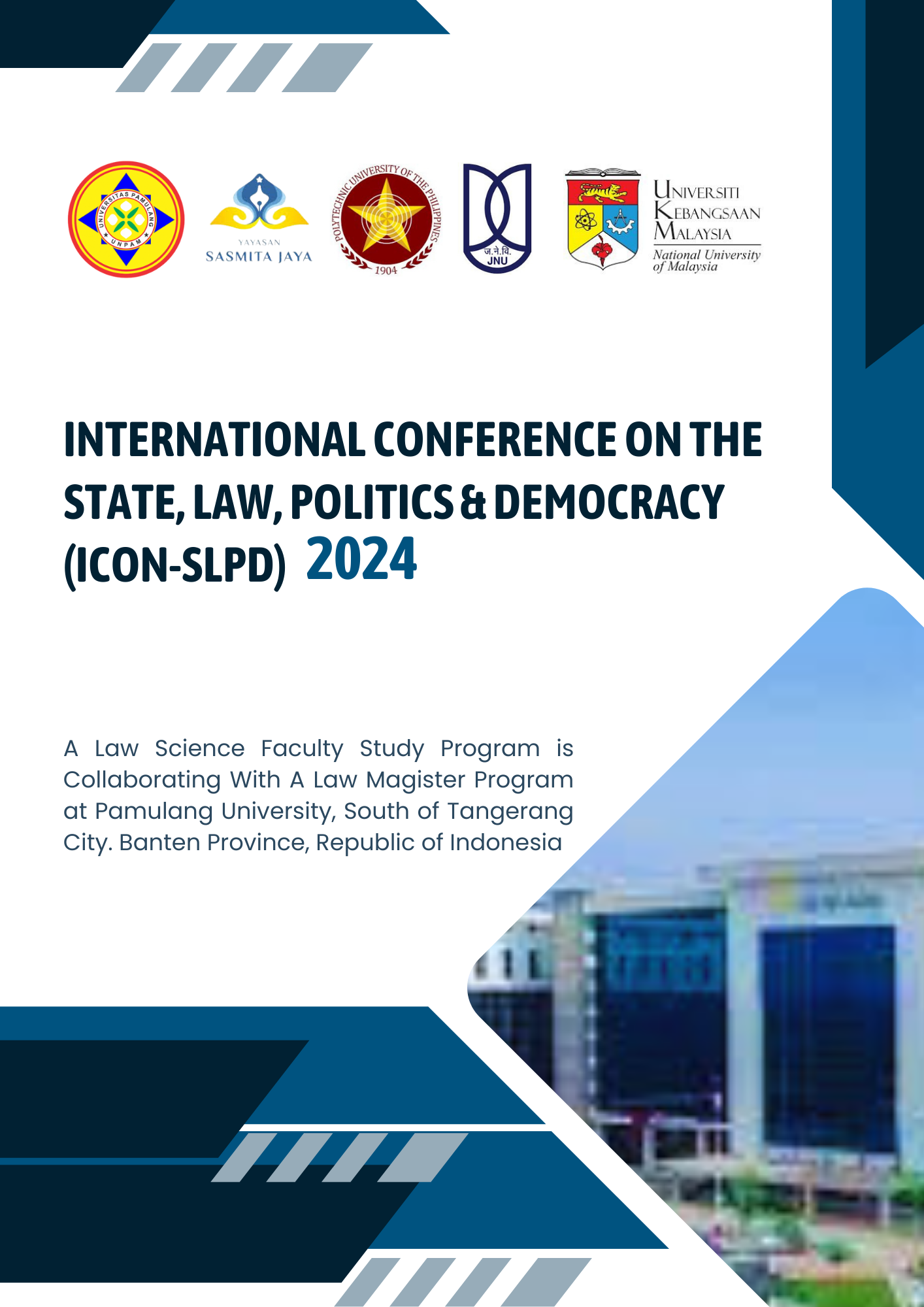Measuring the Importance of Material Testing of Legislation in Indonesia
Keywords:
Law, Procedural Law, Right Of TrialAbstract
Indonesia adheres to the continental European legal system. One of its features is codified law. If it is considered contrary, material testing can be carried out. Judicial review can be conducted in the Constitutional Court if the law contradicts the Constitution of the Republic of Indonesia in 1945. Test the material in the Supreme Court if the regulation of its position under the law is contrary to the law. About any legislation under the order of legislation consisting of the Constitution of the Republic of Indonesia in 1945, the provisions of the People's Consultative Assembly, laws/government regulations in lieu of legislation, government regulations, presidential regulations, provincial regulations, Perda Regency/City. Legal standing must be met to conduct trials both in the Supreme Court and the Constitutional Court, one of which is if the constitutional rights are harmed. The procedural law applicable in testing laws in the Constitutional Court is in accordance with the rules of the Constitutional Court. As is known, all authorities in the Constitutional Court have their procedural laws made internally in the form of Constitutional Court regulations for all authorities. Related to the right of judicial review in the Constitutional Court is the Constitutional Court Regulation No. 2 of 2021 on the procedure for proceeding in cases and testing the law in the Supreme Court in the form of Supreme Court Regulation No. 1 of 2011 on the right of judicial review. Judicial review in the Constitutional Court and the Supreme Court is carried out to maintain the supremacy of the Constitution, strengthen legal consistency, develop laws, and increase public confidence. The method in this study is juridical-normative.
References
Antoni, P. (2018). Dualisme Pengujian Perundang-Undangan oleh Mahkamah Konstitusi. Jurnal Legislasi Indonesia, Vol. 15 (2), 69-79.
Asep, N. (2021, Juli 18). Pengujian Peraturan Perundang-Undangan di Bawah Undang-Undang. Retrieved from Kepaniteraan Mahkamah Agung: https://kepaniteraan.mahkamahagung.go.id/prosedur-berperkara/1752-pengujian-peraturan-perundang-undangan-di-bawah-undang-undang
Bambang, S. (2003). Metodologi Penelitian Hukum. Jakarta: PT. Raja Grafindo.
Bintan, R. S. (1977). Masalah Kekuasan Kehakiman di Indonesia. Jurnal Hukum dan Pembangunan, Vol. 7 (6), 422.
Desip, T., & et.al. (2022). Problematika TAP MPR dalam Hierarki Peraturan Perundang-Undangan dan Peluang Judicial Review ke Mahkamah Konstitusi. Jurnal Legislasi Indonesia, Vol. 19 (3), 396-409.
Fienso, S. (2010). Kamus Hukum. Jonggol: Vandetta Publishing.
Firdaus, M. I. (2022). Kontribusi Civil Law (Eropa Kontinental) Terhadap Perkembangan Sistem Hukum di Indonesia. Jurnal Dialektika Hukum, Vol. 4 (2).
Jimly, A., & Safa'at, M. (2006). Teori Hans Kelsen Tentang Hukum. Retrieved from Perpustakaan Mahkamah Konstitusi: https://simpus.mkri.id/opac/detail-opac?id=10333
Lutfil, A. (2018). Pengujian Peraturan Perundang-Undangan. Malang: Setara Press.
Machmud, A. (2010). Pengujian Peraturan Perundang-Undangan dalam Sistem Perundang-Undangan di Indonesia. Jurnal Konstitusi, Vol. 7 (5), 127.
Meidiana. (2019). Integrasi Pengujian Peraturan Perundang-Undangan oleh Mahkamah Konstitusi. Jurnal Hukum, Vol 2 (2), 381-408.
Muhammad, E. (2021, April 7). Sistem Civil Law. Retrieved from Universitas Jambi: https://eriton.staff.unja.ac.id/2021/04/07/sistem-civil-law/
Ni Komang, M. G. (2011). Penyelesaian Pertentangan Norma Antara Kitab Undang-Undang Hukum Dagang dengan Peraturan Menteri Hukum dan HAM Nomor 18 Tahun 2018 dalam Proses Pendaftaran CV di Indonesia. Jurnal Ilmiah Mahasiswa Berdaulat, Vol. 1 (1), 50-56.
Novia, E. S., & Eny, K. (2021). Konstribusi Sistem Hukum Eropa Kontinental Terhadap Pembangunan Sistem Hukum Nasional di Indonesia. Jurnal Masalah-Masalah Hukum, 363.
Nurul, G. (2015, Juni 24). Meningkatkan Peran LPSK Sebagai Pendorong Perubahan Paradigma Dari Alat Bukti Menuju Partisipasi Dalam Sistem Peradilan Pidana, 16.
Peraturan Mahkamah Agung Nomor 1 Tahun 2011 tentang Hak Uji Materil
Praise, J. W. (2022). Perbandingan Sistem Hukum Civil Law dan Common Law dalam Penerapan Yurisprudensi Ditinjau dari Politik Hukum. Dharmaisya Jurnal Program Magister Hukum FHUI, Vol 2 (37), 1027-1036.
Rianto, A. (2004). Metodologi Penelitian Sosial dan Hukum. Jakarta: Graniat.
Soerjono, S. (2012). Pengantar Penelitian Hukum. Jakarta: Universitas Indonesia Press.
Sulistyowati. (2023). Hukum Acara Mahkamah Konstitusi. Jakarta: Serat Alam Media.
Sulistyowati. (2023). Hukum Konstitusi. Jakarta: Serat Alam Media.
Sulistyowati, & Dewi, N. M. (2022). Tantangan dan Evaluasi Sengketa Perselisihan Hasil Pemilihan Umum. Jurnal Prosiding Seminar Nasional Hukum Tata Negara, 325.
Sulistyowati, et.al. (2023). Urgensi Pembuatan Undang-Undang Hukum Acara di Mahkamah Konstitusi. Jurnal Sosial dan Budaya Syar-i, Vol 10 (5), 1427-1438.
Undang-Undang Nomor 12 Tahun 2011 Tentang Pembentukan Peraturan Perundang-Undangan.





